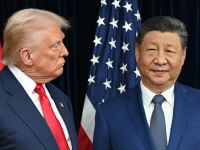Hundreds of tribal chiefs, Islamic clerics and other leading Afghan figures are expected in the Pakistani city of Peshawar on Wednesday to discuss the future of a post-Taliban Afghanistan.
"We have invited more than 800 people -- leaders, scholars, chieftains of tribes," a source close to the National Islamic Front of Afghanistan (NIFA), the moderate group which proposed the meeting, told AFP.
The front, the biggest member of a 19-party coalition working for a peaceful Afghanistan, is headed by Pir Sayed Ahmad Gailani, an influential Islamic spiritual leader and royalist.
Gailani is close to Afghanistan's 87-year-old former monarch, Mohammed Zahir Shah, who lives in exile in Rome.
He is one of a number of Afghan leaders based in Peshawar, a town in northwest Pakistan close to the border with Afghanistan. Participants in the meeting are expected to come from Afghanistan, Pakistan and other countries.
A delegation from Zahir Shah has been invited to Peshawar and the source said some of the king's representatives were expected to attend.
"We are expecting a confirmation," the source added.
The two-day conference has been billed as the "Conference for Peace and National Unity of Afghanistan".
It is to examine the political ramifications of ousting of the Taliban, the hardline Islamic militia in power in Kabul.
The Taliban is under attack from a US-led coalition for harbouring Saudi-born Islamic militant Osama bin Laden, accused by the United States of masterminding the September 11 attacks on the World Trade Center and Pentagon.
The Taliban and Afghanistan's main opposition Northern Alliance, a coalition of ethnic minority groups which controls some 10 percent of the country, have not been formally invited to the meeting.
But representatives of the northern minorities would be welcomed in an individual capacity, the source said.
The Taliban is drawn from Afghanistan's largest ethnic group, the Pashtuns, who reside mainly in the south of the country, and talks have been taking place on ways to include "moderate" members of the regime in a future administation.
Pakistani President Pervez Musharraf has said "moderate Taliban" should be included in a future broad-based Afghan government and US Secretary of State Colin Powell has also left the door open to their participation.
But identifying "moderate Taliban" has been another matter and the source said "we know nothing about so-called moderate Taliban".
"We don't have any contacts," he said.
In a bid to avoid a recurrence of the factional and ethnic bloodshed in Kabul between 1992 and 1996, when the Northern Alliance held power after ousting a Soviet-backed regime, delegates are to examine ways to ensure a future government is as broad-based and multi-ethnic as possible.
The participants are also to discuss the possible convening of a Loya Jirga, a traditional Afghan assembly of elders.
A Loya Jirga, according to Afghan tradition, is a special meeting of all Afghan religious, tribal and ethnic factions, which is called in times of turmoil to unite the country's fractious clans and ethnic groups -- Pakistan, (AFP)
© 2001 Al Bawaba (www.albawaba.com)







